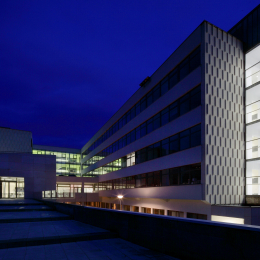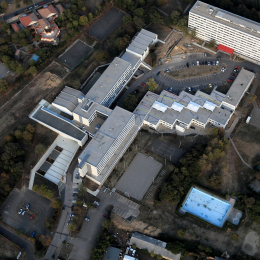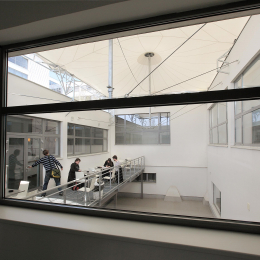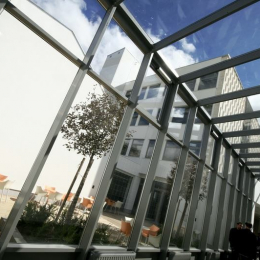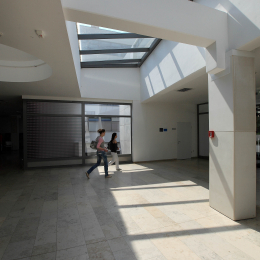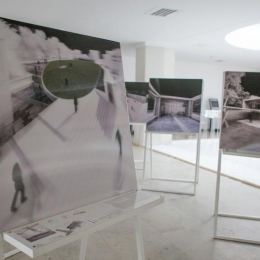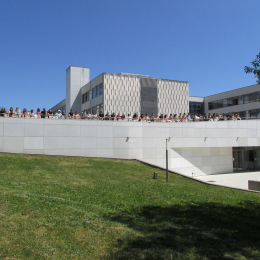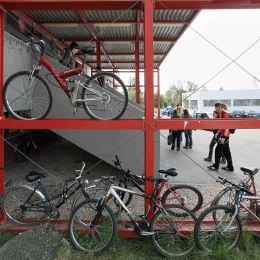History
MIHÁLY POLLACK TECHNICAL COLLEGE 1970-1995
The Pollack Mihály Technical College, the predecessor of the University of Pécs, Faculty of Engineering and Information Technology, was founded in 1970 as a new affiliate of the predecessor Higher Technical School of Budapest. In Pécs, the new educational institution was designed according to the “campus model” with a dormitory, sports fields, swimming pool, and practical training facilities. From the very beginning, the college placed emphasis on a more comprehensive technical foundation, as well as on preparing students for engineering professions and ensuring convertibility. The changes introduced to the curriculum alongside with the practical instruction provided in laboratories and studios have contributed significantly to the practicality of the training, which continues to be a distinctive feature of the institution to this day.
The reorganisation of education and the democratic political transition in Hungary led to a new academic structure with postgraduate engineering specialist training courses besides bachelor courses.
The Pollack Mihály Technical College was integrated into the organizational structure of Janus Pannonius University as Pollack Mihály Technical College.
UNIVERSITY OF PÉCS POLLACK MIHÁLY TECHNICAL COLLEGE 2000-2011
In 2000, the institution was renamed as University of Pécs, Pollack Mihály Technical College. It was possible to obtain a degree in two university-level and seven college-level engineering training programmes, an additional teacher of engineering course (double degree) related to the college-level training programmes, one technical instructor course, and one advanced vocational training course were also available. In 2002, after a successful accreditation process, the university major in civil engineering was launched.
In the 2000s, in response to national and regional needs, fee-based programmes were introduced for those with higher education degrees and professional experience. The Marcel Breuer Doctoral School of Architecture was established in 2003, which, besides offering theoretical training to Ph.D. and DLA students, also provides them the opportunity to join workshops directed by leading lecturers and recognized experts in the field. This practice-oriented approach makes the education in Pécs unique among trainings of this kind.
Beginning with the second half of the 1990s, spectacular infrastructural developments were set in motion. In addition to the refurbishment of educational buildings, lecture halls were equipped with state-of-the-art technology, a computer laboratory was set up, and the laboratories of some courses requiring intensive practical training were significantly renewed. The renovation of the Faculty's teaching and research complex on the Boszorkány-Street campus was also completed.
UNIVERSITY OF PÉCS, FACULTY OF ENGINEERING AND INFORMATION TECHNOLOGY from 2011
From 2011 onwards, the Faculty was called Pollack Mihály Faculty of Engineering and Information Technology, reflecting the growth of computer science engineering in education and research. Since March 2015, when the foreign-language programmes started, the new name of our institution has been University of Pécs, Faculty of Engineering and Information Technology In the same year, a practice-oriented dual training programme with the participation of industrial companies and enterprises was initiated, a programme top-rated among our students.
Our eight BSc programmes cover the disciplines of engineering and the arts in architecture, civil engineering, mechanical engineering, environmental engineering, electrical engineering, computer science, architecture, and industrial design. Through our master’s programmes, the country’s top professionals are trained in architecture, interior design, civil engineering, mechanical engineering, computer science engineering, civil engineering, and urban systems engineering. Furthermore, our students can benefit from innovative research, practice-oriented training, and small-group teaching. Our advanced vocational training courses and postgraduate specialist training courses are organised to address rapidly changing market demands. In 2019, large-scale infrastructural developments were accomplished at the Faculty: two new wings, with architectural studios and open spaces in one and cutting-edge laboratories to support engineering training in the other, were added to the building within the framework of the Modern Cities Programme.


